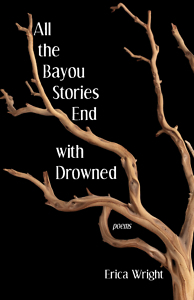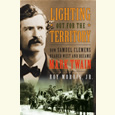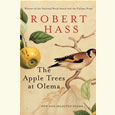Quirks of Survival
The dilemmas of modern life illuminate Erica Wright’s collection, All the Bayou Stories End with Drowned
The poems in Erica Wright’s new collection, All the Bayou Stories End with Drowned, exist in a glittering space between the everyday and the ineffable. Wright—a frequent Chapter 16 contributor who grew up in Wartrace, Tennessee—seems to specialize in the interplay between the shiny surfaces of our lives and our persistent need to reach into the world’s deeper mysteries. Her poems acknowledge that we seem to spend an increasing percentage of our lives teetering on this risky precipice, all the while trying to maintain an unflappable persona for the outside world. As she writes in the standout poem, “Artificial Terrain”: “You want to be the one who swims, / not the one who says, ‘Hello, pond, / what’ve you got down here besides fish?’”
 The true heart of these poems appears to lie beyond the veneer of modern life but never leaves it completely behind. The poems may hint at life’s deep sorrows and grief, but they dwell in a sharper, wittier space, reflecting away from those darker emotions even as they acknowledge them. From this point of view, Wright can rove easily from one subject to another in a voice that remains tonally seamless, shining a light on all manner of modern dilemmas.
The true heart of these poems appears to lie beyond the veneer of modern life but never leaves it completely behind. The poems may hint at life’s deep sorrows and grief, but they dwell in a sharper, wittier space, reflecting away from those darker emotions even as they acknowledge them. From this point of view, Wright can rove easily from one subject to another in a voice that remains tonally seamless, shining a light on all manner of modern dilemmas.
For example, there’s this question: how do we forge lives that encompass both our animal natures and the increasing pressures of our technological era? This dilemma is embodied in a poem like “Select. Start.” The speaker laments, “It’s hard to love men who played video games / as boys. It’s hard when you can’t picture them // skinning their knees on gravel or later sneaking / cigarettes behind school, filling their lungs with bitter, // then exhaling such lack of self-awareness.” An awkward circumstance of modern love is acknowledged but not resolved; instead, the longing lingers.
The same goes for the modern medical paranoia that’s fueled by online symptom searches: “I see myself in a spacesuit riding a mammoth, / trying to diagnose myself from fevers and scabs,” one poem’s speaker says, “and according to the internet, / I may not even be human. It’s that bad.” Often, we carry these private fears into our public lives, struggling to keep them to ourselves: “This wound never gangrenes— / always washed, always clean— / but we must walk around / with the gape, must speak / to the bank teller and later the grocer.” Or, in another poem’s tussle with health fears: “Sometimes your insides want to become / your outsides, and you have to tell them / No.’” There’s no cure for this particularly modern affliction, it seems—we simply know too much now about all the terrible ways we might go down. Even so, we create ways to keep ourselves running: “Each morning, unveiling: / let’s see if the parts still work.”
 So, where might all this tumultuous change be taking us, and who might we become as a result? A memorable poem, “Insurance of the Future,” which appears early in the collection, goes so far as to speculate: “Are we a new species then? Or are we gone // the way of the ancestral mammoths? / Quirks of survival leaves us roaches / but not pterodactyls. So much for majesty.” Do we dare throw up our hands at the modern demands, surrendering to what we might imagine is the greater simplicity of a mere beast’s life? “This is its own luxury, never missing // what was never yours.” The answers to such questions about our nature are never really the point of these poems. They embody Rilke’s famous instruction to “live the questions” which most plague us and seem to live comfortably on those questions’ outermost nervous edges.
So, where might all this tumultuous change be taking us, and who might we become as a result? A memorable poem, “Insurance of the Future,” which appears early in the collection, goes so far as to speculate: “Are we a new species then? Or are we gone // the way of the ancestral mammoths? / Quirks of survival leaves us roaches / but not pterodactyls. So much for majesty.” Do we dare throw up our hands at the modern demands, surrendering to what we might imagine is the greater simplicity of a mere beast’s life? “This is its own luxury, never missing // what was never yours.” The answers to such questions about our nature are never really the point of these poems. They embody Rilke’s famous instruction to “live the questions” which most plague us and seem to live comfortably on those questions’ outermost nervous edges.
Much of Wright’s work in All the Bayou Stories End with Drowned underscores our need to keep reaching out—either toward one another or toward the timeless, ineffable mysteries of life. In this sense, Wright’s is a hopeful vision. Of this resilient human desire, she writes: “We thirst at the entryway / where we were met by the chlorine / scent of modern baptism.” Our ideas of survival, and of transcendence, may remake themselves to survive the passing of time, but they—like us—go on seeking new form and new voice.

Emily Choate holds an M.F.A. from Sarah Lawrence College. Her fiction has been published in Shenandoah, The Florida Review, Tupelo Quarterly, and The Double Dealer, and her nonfiction has appeared in Yemassee, Late Night Library, and elsewhere. She lives in Nashville, where she’s working on a novel.


